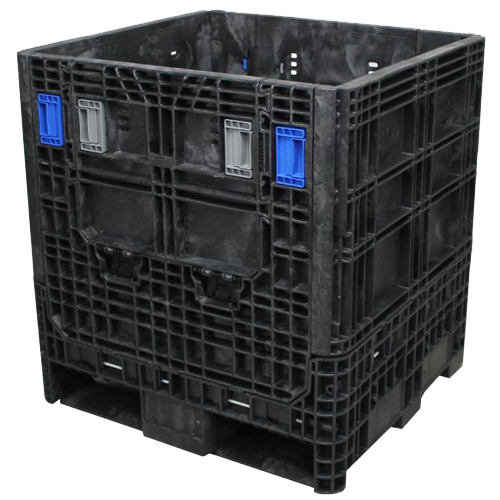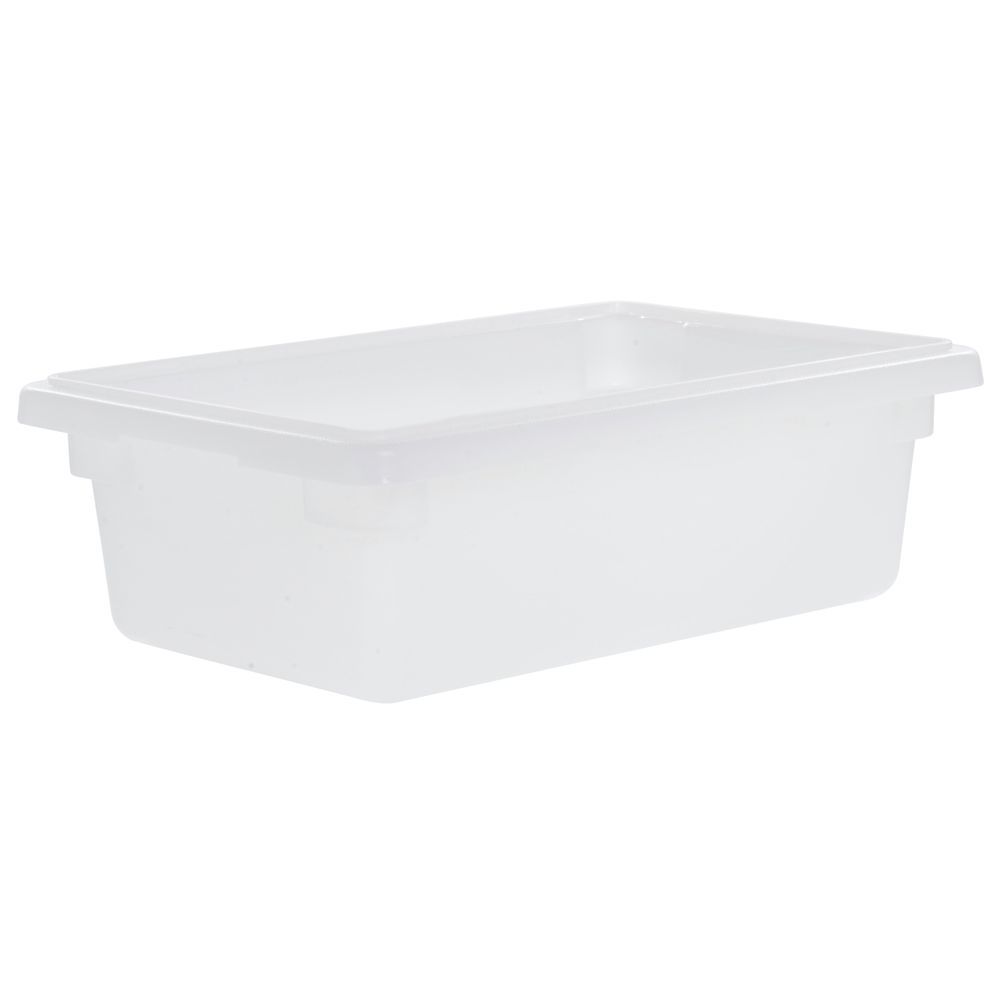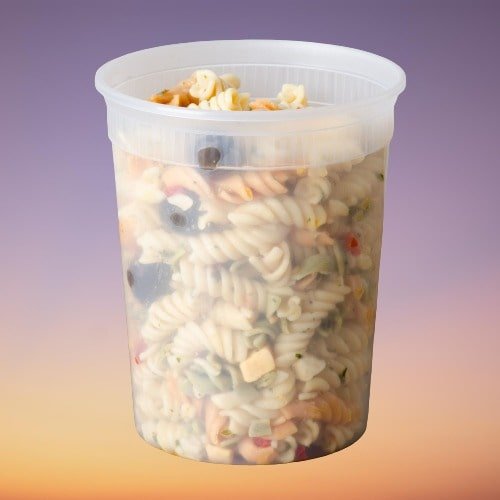Discover how reliable Bulk Plastic Containers can improve your storage solutions
Wiki Article
The Duty of Mass Plastic Containers in Effective Recycling Practices and Sustainability
Bulk plastic containers are essential to modern reusing initiatives. Their layout enhances the performance of product collection and transport, adding to sustainability objectives. These containers not just optimize room however likewise assist in keeping track of contamination degrees. However, their application is not without difficulties. Comprehending the complete scope of their influence exposes a complicated partnership between logistics and ecological duty that necessitates additional exploration.Recognizing Mass Plastic Containers
Mass plastic containers function as a crucial part in different sectors, promoting the storage space and transportation of goods. These containers are commonly made from durable products such as high-density polyethylene (HDPE) or polypropylene, which supply resilience and resistance to environmental elements. Their layout commonly consists of features like stackability and modularity, enabling for effective use of room during both storage space and transportation.Industries such as agriculture, food processing, and manufacturing frequently use bulk plastic containers due to their light-weight nature and convenience of handling. The containers come in various sizes and configurations, catering to the specific requirements of different items. Their flexibility prolongs past plain functionality; they can likewise be tailored with covers, deals with, and labeling choices to improve usability - Bulk Plastic Containers. As an outcome, mass plastic containers play a critical duty in optimizing logistics and supply chain procedures across several markets, therefore adding to overall performance and cost-effectiveness
Benefits of Using Bulk Plastic Containers in Recycling
The utilization of mass plastic containers substantially boosts the effectiveness of the procedure when companies prioritize recycling efforts. These containers are developed to maximize space, enabling the storage and transportation of bigger amounts of recyclable materials. This leads to less trips to reusing centers, consequently lowering fuel intake and connected exhausts.In addition, bulk plastic containers are durable and resistant to numerous ecological variables, making sure that materials remain protected during handling and transit. Their lightweight layout further contributes to decrease transportation prices.
The harmony of these containers promotes much better sorting and handling of recyclable products, which can boost total recycling prices. Organizations that embrace bulk plastic containers likewise show a dedication to sustainability, favorably influencing their brand name picture. Inevitably, these advantages not only streamline recycling techniques but also add to broader ecological objectives
Exactly How Bulk Plastic Containers Facilitate Material Collection
Reliable product collection is greatly improved by the usage of mass plastic containers, as they give a efficient and structured service for collecting recyclable products. These containers are made to accommodate big quantities of products, which simplifies the sorting and storage process. Their stackable layout takes full advantage of room usage, making it simpler for facilities to arrange recyclables without clutter.On top of that, bulk plastic containers are sturdy and weather-resistant, permitting exterior placement without destruction. This resilience guarantees that products stay secured up until they are gathered for processing.

The uniformity in shapes and size of these containers helps with standardization throughout collection points, enabling far better tracking of recyclable quantities. Their transparent nature enables for simple presence of components, assisting in the monitoring of contamination degrees and ensuring that just proper materials are accumulated. Overall, bulk plastic containers play a critical function in streamlining the product collection procedure, thereby advertising effective reusing practices.
Transport Performance and Environmental Impact
Transportation effectiveness plays a vital duty in the recycling procedure, especially with the optimization of tons ability wholesale plastic containers. By maximizing the quantity of product moved, companies can significantly lower the variety of journeys called for, therefore decreasing their carbon footprint. This method not just boosts functional efficiency but also adds to extra lasting ecological techniques.
Optimizing Tons Capacity
Maximizing lots capacity is commonly neglected, it plays a necessary role in enhancing transportation effectiveness and lessening environmental effect in recycling techniques. By taking full advantage of the quantity that bulk plastic containers can hold, recycling operations can minimize the number of journeys required for transport. This not only reduces gas usage but additionally lowers the deterioration on lorries. Efficient tons monitoring enables centers to utilize space properly, guaranteeing that each transportation cycle is as efficient as possible. Additionally, well-optimized tons can lead to much better settlements with logistics suppliers, potentially decreasing overall expenses. Ultimately, boosting lots capability adds to a much more sustainable reusing system by promoting effective source use and decreasing waste created throughout transportation.Minimizing Carbon Footprint
As recycling procedures endeavor to reduce their ecological effect, decreasing the carbon impact connected with transportation becomes a critical goal. Mass plastic containers play an essential role in attaining this objective by improving tons performance and enhancing logistics. Their lightweight yet long lasting design permits optimum cargo area use, decreasing the number of journeys called for to transport products. By consolidating deliveries, reusing facilities can decrease fuel consumption and greenhouse gas emissions. Furthermore, purposefully finding recycling facilities lessens transportation ranges, in addition reducing carbon results. Moreover, employing fuel-efficient lorries and alternate energy sources enhances general sustainability. By integrating these techniques, the recycling sector can appreciably reduce its carbon footprint, contributing to a more lasting future.Difficulties in making use of Bulk Plastic Containers

Contamination Issues
Contamination issues stand for a considerable difficulty in the effective usage of bulk plastic containers within recycling methods. These containers frequently accumulate deposits from previous materials, resulting in combined products that can hinder the recycling procedure. Pollutants such as food waste, chemicals, or non-recyclable products can jeopardize the honesty of the whole batch, causing boosted disposal expenses and decreased reusing prices. In addition, inappropriate cleaning or sorting can aggravate these issues, making it tough for recycling facilities to process products effectively. The presence of pollutants not only impacts the high quality of recycled items however additionally weakens the overall sustainability efforts focused on reducing plastic waste. Resolving these contamination difficulties is important for boosting the efficiency of mass plastic container recycling.Recycling Infrastructure Limitations
Ineffectiveness in reusing infrastructure poses substantial challenges for the effective management of bulk plastic containers. Many reusing facilities lack the ability to refine huge quantities of these containers successfully, leading to increased costs and delays. In addition, insufficient sorting technologies typically cause contamination, as mass containers might be mixed with various other products, making complex the reusing procedure. Minimal transport alternatives also impede the motion of mass plastic containers to proper recycling centers, leading to increased land fill waste. Furthermore, an absence of standard protocols for recommended you read bulk container reusing creates confusion amongst organizations and customers, even more complicating efforts to advertise sustainability. Addressing these infrastructure constraints is vital to enhance reusing methods and optimize the potential of bulk plastic containers in a round economic climate.Finest Practices for Implementing Bulk Plastic Containers
They should prioritize a calculated approach that enhances effectiveness and minimizes contamination threats when organizations take into consideration implementing bulk plastic containers in their recycling practices. First, selecting the suitable container size and kind is vital to fit the quantity of products being refined. Organizations ought to likewise develop clear labeling and signs to assist users on correct disposal approaches, lessening complication and errors. Regular training sessions for staff can further strengthen these practices, guaranteeing everyone understands their functions in maintaining recycling integrity.
Furthermore, companies need to apply a regular maintenance timetable to inspect and tidy containers, protecting against the build-up of impurities. Partnering with neighborhood recycling facilities can likewise streamline the collection process, guaranteeing that materials are successfully processed. Organizations ought to check and examine their reusing metrics, using this information to improve techniques over time and promote constant improvement in their sustainability initiatives.
The Future of Bulk Plastic Containers in Lasting Practices
As organizations progressively focus on sustainability, the duty of mass plastic containers in reusing techniques is set to evolve significantly. Advancements in products scientific research are bring about the development of eco-friendly and recyclable alternatives, improving the environmental benefits of bulk plastic containers. In addition, the execution of closed-loop systems will certainly permit easier collection and repurposing of these containers, minimizing waste and source usage.Technical advancements, such as smart radar, will make it possible for companies to check the lifecycle of mass containers, boosting efficiency in reusing processes. As customer need for lasting practices grows, businesses will likely adopt mass plastic containers designed for reuse and long-term worth. In addition, collaboration between governments and markets visit their website will certainly foster the establishment of standard reusing methods, guaranteeing that bulk containers are properly incorporated right into more comprehensive sustainability initiatives. In general, the future of bulk plastic containers appears promising, with significant possibility for contributing to a round economic climate.
Frequently Asked Concerns
How Are Bulk Plastic Containers Made and What Products Are Made use of?
Mass plastic containers are usually made from high-density polyethylene (HDPE) or polypropylene (PP) These materials are refined with shot molding or impact molding techniques, resulting in sturdy, lightweight containers ideal for various storage space and transportation requirements.
Can Bulk Plastic Containers Be Reused Multiple Times Before Recycling?
Yes, bulk plastic containers can be recycled several times prior to recycling. Their longevity and layout allow for repeated usage in different applications, promoting sustainability and resource performance while decreasing the need for new containers.
What Qualifications Exist for Mass Plastic Containers in Recycling?
Numerous certifications for mass plastic containers include the Recycling Partnership's accreditation, the Cradle to Cradle Certified ™ requirement, and the Sustainable Product packaging Coalition's guidelines, guaranteeing containers fulfill details ecological and recyclability criteria for effective recycling.Exactly How Do Bulk Plastic Containers Compare to Various Other Recycling Storage Space Options?
Mass plastic containers provide better resilience and capacity contrasted to various other reusing storage space options, lowering the risk of contamination and helping with reliable transport. Their layout supports far better organization, boosting overall efficiency in recycling procedures.What Is the Life-span of a Bulk Plastic Container in Recycling Processes?
The life expectancy of a mass plastic container in reusing processes usually ranges from 5 to 10 years, depending on usage, worldly quality, and ecological problems, allowing for multiple cycles of use prior to ultimate disposal or recycling.When organizations focus on reusing initiatives, the utilization of bulk plastic containers considerably boosts the effectiveness of the process. Transport effectiveness plays a crucial role in the reusing procedure, especially through the optimization of load capacity in bulk plastic containers. The use of bulk plastic containers in reusing techniques deals with Related Site substantial difficulties, particularly worrying contamination issues and limitations within recycling infrastructure. Contamination concerns represent a significant obstacle in the efficient usage of bulk plastic containers within recycling methods. When organizations take into consideration implementing bulk plastic containers in their reusing techniques, they must prioritize a tactical technique that enhances efficiency and decreases contamination dangers.
Report this wiki page